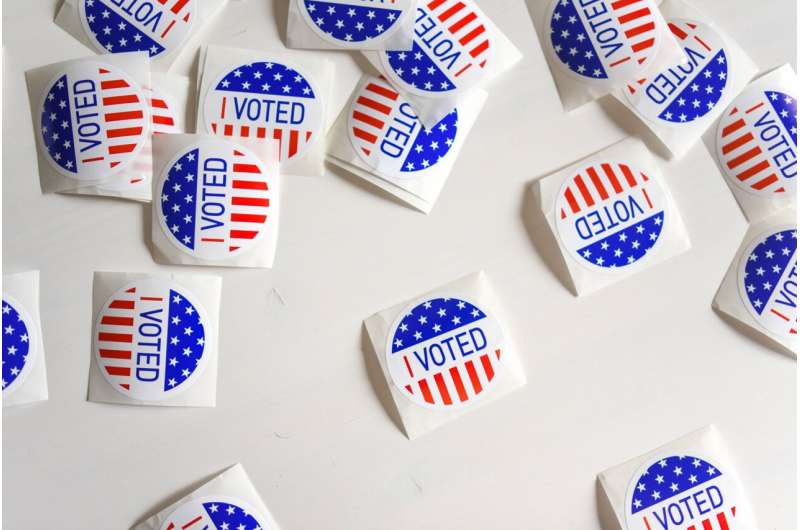Why only some voters have climate change on the brain this November

On Election Day, voters across the country will make their voices heard on many contentious issues, from reproductive rights to cannabis legalization. Nov. 8 also lands on the second day of the 2022 United Nations Climate Change Conference and at the tail-end of the sixth-warmest year on record.
According to a recent Washington Post-ABC News poll, about half of registered voters say climate change is either "very important" or "one of the most important issues" in their vote for Congress, with Democrats, Black Americans and Hispanic Americans more likely to state climate change as a voting priority than independents, Republicans or White Americans.
Matt Burgess, assistant professor of environmental studies, affiliated faculty of economics and a fellow in the Cooperative Institute for Research and Environmental Sciences (CIRES) at CU Boulder, specializes in the economics of climate change, the political polarization of climate change and how to reduce it. CU Boulder Today spoke with Burgess to learn more as voters cast their midterm ballots.
How has climate change become so polarized?
The polarization of climate change is somewhat recent. In the late 1980s, when Americans were polled on their concern about climate change, the fraction of Democrats, Republicans and independents that said "yes" were identical. Climate change became polarized in the 1990s and 2000s in part because there's more of a Libertarian economic aspect of conservative ideologies in English-speaking countries like the U.S. It's hard to avoid the conclusion that there's going to need to be some kind of government involvement in solutions to climate change, which maybe clashes with Libertarian ideologies. There's also been well-documented efforts by fossil fuel interests and other interest groups contributing to some of the division on climate change.
Is this polarization getting worse?
Since about 2015, there's some evidence that the polarization in climate change has been reducing a little bit, while at the same time, polarization has been supercharging on a lot of other issues. If you ask Americans recently, do you think that Congress should be doing more about climate change? About two-thirds say "yes," including almost a 60% majority in some of our most conservative districts. Even in U.S. Rep. Lauren Boebert's district in Colorado there's an overwhelming support for a number of specific climate policies and climate initiatives, as clean energy has become very popular as it's become cheap. Everybody likes jobs. Everybody likes infrastructure. These are things that are going to be a big part of the sustainable transition.
Will climate change impact the upcoming midterms?
It depends a bit on how you think about the polls. If you just ask people, what's the most important issue to you in this election? Climate change doesn't rank particularly high on that list, even for Democrats, and certainly not compared to issues like crime and inflation, voting rights and abortion, democracy and security. Now, some people would argue, correctly, that climate change affects many of those issues. So it may be that the polls that directly ask voters to rank their priorities are understating the importance of climate change. But climate change probably isn't going to be the No. 1 or No. 2 issue in these midterms.
Is bipartisanship possible on climate change legislation?
We are still polarized in many respects on climate change but we're also not in a couple of interesting ways. A former student and I did a state-level analysis of decarbonization bills since 2015 and we found that about a third of them were bipartisan. The ones that were bipartisan disproportionally did three things: First, they expanded consumer and business choice—offering new green options instead of taking away options; second, they use financial incentives; and thirdly, they framed environmental justice in terms of class or economics. If you look at recent federal bills on climate, there have been some that have been bipartisan. The Chips and Science Act being one example, and even the Inflation Reduction Act, which passed on party lines, also included those three characteristics.
How do we get more bipartisan partnerships to tackle climate change?
I think the voters are going to get us there. Eventually. The approach of "do nothing," which sometimes has been the approach of the Republican Party, is just not popular—even in deeply conservative districts. So from the perspective of the Republican and conservative parties, the answer is that you have to do something, or you're going to lose. From the standpoint of liberal parties, the last couple of years have revealed that there are some aspects of what people call the progressive wing and their ideology that are quite unpopular, and that have cost them dearly in elections.
There's lots of reasons for people both ideologically aligned with liberals and with conservatives to care about climate change. Everyone loves jobs and infrastructure, clean air, clean water and clean energy. Everyone should want America to lead in this energy transition. If climate change is really an emergency, then we should be willing to compromise on other parts of our agenda to get it done.
Provided by University of Colorado at Boulder




















